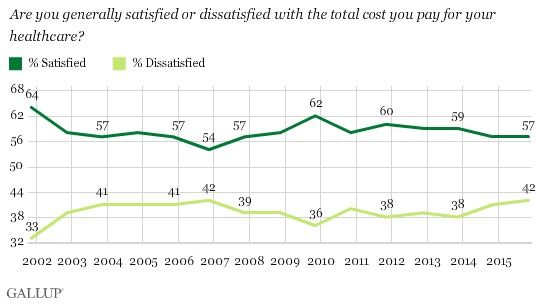- Center on Health Equity & Access
- Clinical
- Health Care Cost
- Health Care Delivery
- Insurance
- Policy
- Technology
- Value-Based Care
Americans' Satisfaction With Healthcare Quality, Cost, and Coverage No Better Than Before the ACA
Despite changes to the United States healthcare system, Americans' overall satisfaction with the total cost they pay for healthcare has been stable over the past 14 years, according to a Gallup survey, which also found little changes in satisfaction with healthcare quality and coverage.
Despite changes to the United States healthcare system, Americans’ overall satisfaction with the total cost they pay for healthcare has been stable over the past 14 years, according to a Gallup survey, with 57% reporting they are satisfied.
This satisfaction with US healthcare remains stable despite the fact that Gallup also found cost is one of the most urgent health problems.

“One might expect that their satisfaction with healthcare costs would drop after the Affordable Care Act (ACA) brought more previously uninsured people into the system and made changes to coverage,” wrote Gallup’s Frank Newport. “However, satisfaction with healthcare costs has remained relatively stable.”
Gallup also found that 53% of Americans rate the quality of healthcare in the US as “good” or “excellent,” which is similar to the rating prior to the insurance exchanges of the Affordable Care Act (ACA) opened, and down from the more positive ratings of 2008-2012. Healthcare coverage in the US is viewed less favorably than quality, although it is higher now (33%) than before President Obama took office (27%).
Americans who are insured through Medicare or Medicaid are more satisfied with the cost of their insurance than those who have private insurance. Similarly, an earlier survey found that people with government plans are also more satisfied with how the healthcare system works.
Overall, just 21% said they are satisfied with the total cost of healthcare compared with 28% in 2001. After 2001, satisfaction fell and only rose in 2009 to 26%, which Gallup attributes to possible optimism about the potential of President Obama’s healthcare reform.
“Although Americans were more positive about the cost, quality and coverage of US healthcare in the early years of the Obama's first term, that optimism has faded to some degree,” Rebecca Rifkin wrote for Gallup. “Americans' ratings of healthcare coverage are not high, but remain higher than they were in George W. Bush's second term.”
